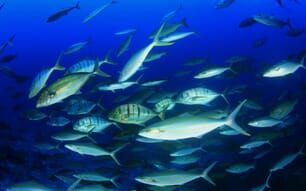Fishing quotas are used to ensure fishing remains sustainable and setting the right quotas requires accurate assessment of fish stocks. Accurate recorded catches from fisheries are a critical part of estimating fish stocks.
Swedish fishers are required to provide daily reports of both their catches and their fishing 'effort' – in this case, the number of boats on the water, fishing. Only catches, not fishing effort, are limited by quotas. However, the reliability of catch records has frequently been questioned by the ICES Baltic Fisheries Assessment Working Group, which has suggested that misreporting has affected assessment of fish stocks.
This study aimed to estimate whether misreporting occurs in Swedish pelagic fisheries, which catch open-ocean fish such as sprat and herring. These species are important parts of the Baltic Sea's food web and, as such, it is vital to ensure that they are only caught in sustainable numbers to protect the ecosystem of this unique area.
The researchers developed a way of reconstructing historical catches based on fishing effort rather than reported catches. Fishing effort was assumed to be more reliable than reported catches by the researchers for a number of reasons. Firstly, while fishers may deliberately misreport catches because of quotas, this should not affect their records of fishing effort, as this is not constrained by quotas or regulations. As such there is no incentive to misreport fishing effort. Additionally, the activity of fishing vessels is easily monitored by control agencies, and therefore more difficult to misreport.
Using this method, they analysed logbook data from all trawl-fishing operations (i.e. the fishing effort) for pelagic fish between 1996 and 2009. They then compared their estimated catches to those reported by fishers.
The results showed that the mismatch between reported and estimated catches varied. For example, estimated catches of herring were significantly higher than officially recorded catches in 2002 to 2006, but they were lower than officially reported catches between 1996 and 2000. The authors note the latter is an unexpected finding, and may be due to an underestimation by the model, suggested by unexplained variation in the data for the years 1996-2000. Between 2002 and 2006 the model explained the variation in the data well, suggesting that there were no similar problems in these later years. For sprat, estimated catches were significantly higher that the reported catches in 2002 to 2009, but lower in 1997.
On average, the catch capacity of the fishing fleet in the Swedish Baltic Sea was 137 per cent higher than required to meet the quotas for herring and sprat. This represents an overcapacity in the fishing fleet, which, the study's authors say, could be providing an economic incentive to misreport catches, thereby skewing calculated quotas.
The authors also point to a number of additional studies and factors which support their findings. For example, previous modelling of the economics of fishing in the Swedish Baltic indicates that the costs of running the fishing fleet should have been higher than benefits, given the reported catches. There have also been several convictions of fishermen, as recently as 2008, for underreporting as well as trading and transferring catches to foreign vessels. In order to protect the Baltic Sea ecosystem, management of fisheries should be reformed to better reflect fish stocks, the study's authors say.
Source: Hentati-Sundberg, J., Hjelm, J., & Österblom, H. (2014). Does fisheries management incentivize non-compliance? Estimated misreporting in the Swedish Baltic Sea pelagic fishery based on commercial fishing effort. ICES Journal of Marine Science. DOI:10.1093/icesjms/fsu036


